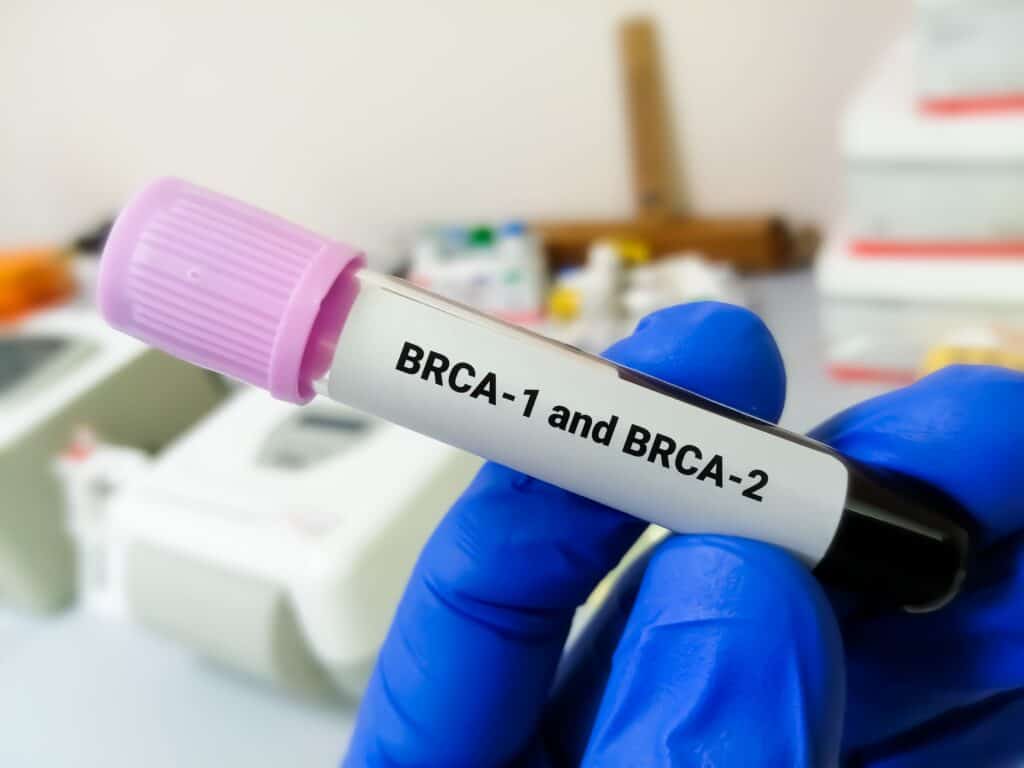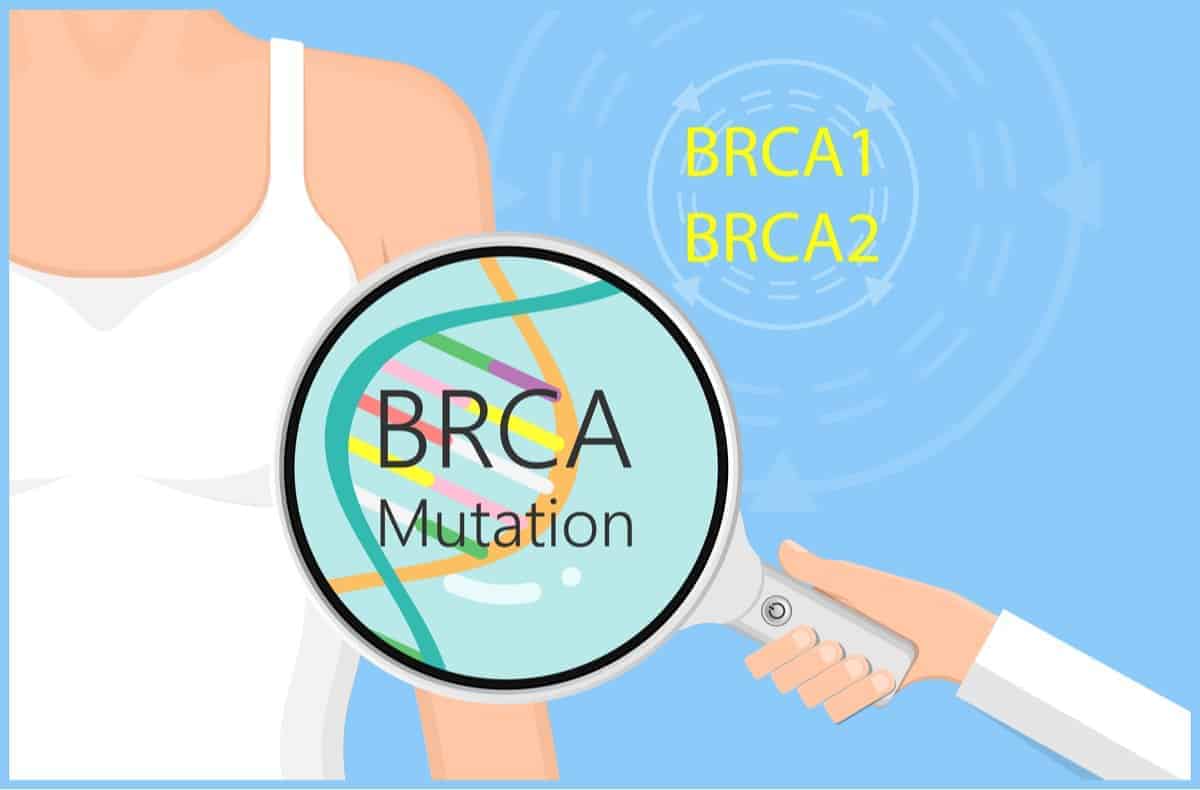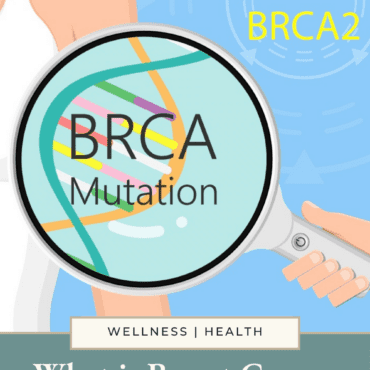What is breast cancer genetics testing is a question I’ve been asked with increasing frequency over the years, as this type of evaluation has become more common.
I’m here to help clarify the specifics of BRCA testing and discuss how I navigate the maze that is women’s healthcare today.
What Is Breast Cancer Genetics Testing
On a simple level, breast cancer (BRCA) genetics testing is a blood test to determine if you have mutations in your DNA that increase your risk of breast cancer.
What Does the Term BRCA Mean?
The term “BRCA” is an abbreviation for the breast cancer gene, which can be inherited from either parent.
As you can see below, the shorthand is quite logical:
• (BR)reast
• (CA)ncer
Where is the Breast Cancer Gene Located?
According to Ginny Jordan, a breast cancer survivor and author of Clear Cut, the BRCA mutation is located on the long arm of chromosome 13q12.
Are BRCA Genes Bad?
Every human has both of the BRCA genes, they are normal and in fact, do important work because they produce proteins that help repair damaged DNA.
The Breast Cancer Mutation
However, the BRCA1 and BRCA2 genes have been found to impact a person’s chances of developing breast cancer.
While everyone has two copies of each of the BRCA genes, one inherited from each parent, problems may arise when a mutation occurs, as there is a higher risk of cancer.
Difference Between BRCA1 and BRCA2?
According to the Maurer Foundation, “both mutations increase the risk of ovarian cancer as well as pancreatic cancer. A BRCA1 mutation can also increase the risk of cervical, uterine, and colon cancer, while BRCA2 can increase the likelihood of stomach, gallbladder, and bile duct cancer, plus melanoma.”
Read on for more details below.
Test for Breast Cancer Gene
If you take the test for the breast cancer gene mutation and you test positive, what does it mean?
Essentially, those who test positive don’t have the proteins needed to fight tumor formation and are at a higher risk of contracting breast cancer than the average person without the mutation.
What Happens If I Test Positive for the Breast Cancer Gene Mutation?
According to Sharsheret, receiving a positive test result indicates you have inherited a mutation in the BRCA1 or BRCA2 gene, or far less frequently, both of, the breast cancer genes.
If you’re wondering, does having the BRCA mutation mean I’ll definitely get cancer, the answer is no. The test result provides information about your risk of developing cancer. It cannot be used to predict whether or not it will actually develop, or when.
In summary, a positive result means a higher likelihood of cancer but doesn’t mean you’re certain to develop it.
Mutations BRCA
Mutation carriers have a number of options they can consider to manage their risk, including screening, risk reducing surgeries such as prophylactic mastectomy, and medications that reduce cancer risk.
These options are best to discuss with your healthcare professional.
Celebrities with BRCA Mutation
You may have heard of this high-risk gene variant in the media as a number of celebrities are carriers including:
- Angelina Jolie
- Christina Applegate
- Sharon Osbourne
Cancer Development and BRCA Mutation
While a BRCA mutation doesn’t mean you’ll automatically get cancer, those with either of the BRCA mutations have a far higher risk than the general population, i.e., those who do not suffer from the mutation.

At What Age Should BRCA Testing be Done?
Most health organizations recommend breast cancer genetics testing for women who have a family history at age twenty-five.
How Often Do I Need Breast Cancer Genetics Testing?
Whether or not you are in a high-risk category for the BRCA mutations, i.e. have a family history of breast cancer, or are an Ashkenazi Jew, you will only need to undergo genetic testing for these mutations once. It is a simple blood draw.
My Breast Cancer Genetics Testing Journey
I was tested for the BRCA mutations in 2008 when I was forty-one years old.
I asked for this genetic test because of my double risk factors: I am of Ashkenazi Jewish descent and have a family history of breast cancer. My paternal grandmother suffered from breast cancer at an age that is considered fairly young, prior to fifty.
When I asked for the breast cancer genetic test my practitioner replied: I’ve never had anyone test positive for this, so you don’t need it.
The Power of Circular Thinking in the Field of Science
Telling a patient that they don’t need a test because another patient was negative is a form of psychic projection and circular thinking that is unscientific but not uncommon in the world of women’s healthcare.
If you’re telling your patients this story, it’s likely you’re not testing all that many of them; thus, you’re not going to get a lot of results –and at that, your anecdotal data will be highly skewed.
How to Get the Breast Cancer Gene Test
Getting the breast cancer gene test should be simple, but we know there is nothing simple about delivering women their healthcare, at least in the US.
After receiving a reply of “no” to my request for BRCA mutation testing, I told the practitioner of my family history of breast cancer, etc.
The reply remained the same. I knew that although I was at high risk of being a BRCA mutation carrier, getting this simple blood test wouldn’t be easy.
Autoimmune Conditions and the Women’s Healthcare System
My autoimmune disease diagnoses developed the negotiation skills our healthcare system demands.
Autoimmune Diseases Symptoms
Over twenty-five years and the course of several autoimmune conditions (including celiac disease, MS, and thyroid disease) I’ve learned to navigate our stressful healthcare system. Autoimmune diseases symptoms are fantastic preparation for that.
As patients, we don’t expect to expend maximum effort to receive basic care. Yet, it is critical that we deploy every skill we have, using our powers of persuasion to get the tests and treatment we need.
Genetic Testing Breast Cancer to Rule Out…
Along those lines, I cheerily said to my doctor:
I’m sure you’re right! Let’s test to simply rule it out.
It was an offer so logical, there was no way to refuse.
Breast Cancer Genetic Testing
What happened in terms of the results? You can probably guess. The test came back positive for the BRCA2 mutation and I’ve been under high surveillance ever since.
Breast Cancer Screening
If you test positive for either (or both of) the BRCA mutations your recommended screening is surveillance every six months via mammogram or MRI.
My breast cancer screening consists of:
- Breast MRIs
- Mammograms
- Breast Ultrasounds
Breast Cancer Screening and Thermograms
Prior to and for a while after finding out that I had the BRCA mutation, I did thermogram screening for my breasts.
One of my favorite Functional Medicine doctors told me that while thermography is a fantastic screening tool, it is so advanced in detecting early masses that “no one really knows what to do” with it.
What is the Difference Between BRCA1 and BRCA2?
If you test positive for the BRCA gene, it’s important to understand more about it.
First, as I mentioned, there are two types of breast cancer mutations, BRCA1 and BRCA2. Read on for more information on each one.
What is BRCA 1 Mutation?
The BRCA1 mutation is associated with an increased risk for triple negative breast cancer which is a very aggressive and difficult form of cancer to treat.
According to Facing Your Risk, the lifetime risk of breast cancer in a BRCA1-positive individual is around 65% as compared to 12.5% for a woman of average risk.
Women with BRCA1 mutation also face an increased risk of ovarian cancer of around 40% versus 1.3% for a woman of average risk.
There is also an increased risk of pancreatic cancers with the BRCA1 mutation.
What is BRCA 2 Mutation?
Facing Your Risk goes on to state that the lifetime risk of breast cancer with a BRCA2 mutation is around 60%, compared with 12.5% for the woman of average risk.
For ovarian cancer, the lifetime risk with a BRCA2 mutation is approximately 15%, as compared with a 1.3% incidence for a woman of average risk.
Those with the BRCA2 mutation have an increased risk of all of the following cancers:
- Breast
- Ovarian
- Pancreatic
- Gall Bladder
- Melanoma
Breast Cancer 4 Stages
If you’re wondering how many cancer stages are there the answer is four.
Why do I mention this in a post about breast cancer genetic testing? Because the two are inextricably related when it comes to catching cancer early, i.e. Stage 1.
Cancer by Stages
I still remember when my Father had Stage 3 colon cancer, and he discussed it with my children. One of my boys, around 11 years old back then, asked what’s after that? My Father said Stage 4, then my kiddo asked, what’s after Stage 4? My Dad replied, “death.”
Genetic testing for breast cancer is a very reasonable way to work towards catching and preventing later stage breast cancers.
Breast Cancer Education and Breast Cancer Month
Breast cancer education is an important part of cancer prevention and treatment.
If you’re wondering when is breast cancer month it’s in October each year. In addition to raising awareness of breast cancer, it’s important to continue the effort and make sure that women have access to good cancer prevention and treatment.
Awareness and talk without proper delivery of medical services are simply chatter laced with empty promises, and women deserve better.
Best Breast Cancer Non Profits
Here is a list of my favorite organizations that do work in, and around, the field of breast cancer:
- Sharsheret
- Not Putting on a Shirt
- Global Patient Advocacy Coalition
- Silver Linings Holistic Health
- National Comprehensive Cancer Network
Your Breast Cancer Genetics Testing Story
The field of breast cancer mutations and genetics, in general, is an exciting, and emerging area of science that clinicians are still catching up on. This guide is to help you understand your options and the surrounding choices.
Do you have either of the BRCA mutations? Or perhaps you’re dealing with breast cancer and post mastectomy pain syndrome.
Maybe you find yourself having to tap dance your way around your doctor to receive basic medical services and care? Leave a comment and tell me all about it! I want to know!






Suzanne Burnell says
Sending you infinite waves of love. Sending you infinite waves of gratitude for your fierce and beautiful health information. I have been following you and using your books for many many years. It’s very and I mean very rare and I mean almost never for me to suggest something. Only if you’d like. I won’t share it here.
Love,
Suzanne
Elana says
Suzanne, thanks for your offer to help, really appreciate it.
Betsy says
I hope your journey takes you to new and greater awareness and joy for living . And hope you are able to end your chronic pain.
For the same reason that you didn’t receive the information and options you were seeking after surgery I would caution accepting all genetic testing and procedures as definitive before.
Cancer is a harsh, cruel and enormous industry.
Elana says
Thanks Betsy.
Hasna says
Hi Elana thank you for sharing this excellent article about breast cancer. You have explained in detail about BRCA genes and gene testing. One of my aunts suffered from breast cancer. She was diagnosed at stage 1. She undergoes surgery, chemotherapy, and radiation. Now she is taking some medicine as part of the treatment. Breast cancer BRCA testing was done at FML Dubai. They provide excellent service with accurate results.
Elana says
Thanks Hasna, appreciate your feedback and so sorry to hear about your aunt.
Cindy says
I want to thank you for putting this up for everyone to read. i would love to know where i can get tested for this. My sister just found out she has breast cancer so i want to get tested. I live in Kansas City Missouri and if at all possible help me find somewhere to do this. Thank you so much.
Elana says
Cindy, thanks for your comment and for checking in! I’m so sorry to hear about your sister. This is a test that should be done by your primary care physician or your OB/GYN given that you now unfortunately have a family history of breast cancer. If you ask either of your doctors to do this and they refuse to order this test, you can ask them to “document refusal” on your chart, then ask to view the physical chart so that you can verify they adhered to your wishes and documented their refusal. In all of the cases I’ve followed, the doctor pivots and administers the requested tests/care after “document refusal” is requested, given that this can leave them open to legal action, etc. Please keep me posted and LMK how it goes :-)
Cate says
It is also very easy to order BRCA testing yourself through labs such as Ulta Lab Tests, 23 & Me and many others. Better to have a supportive, competent doctor, but with a myriad of testing options online, we no longer have to be at the mercy of our medical system.
Elana says
Thanks Cate.
HAZHAR OMER says
Thank you for the article.
Elana says
Omer, you’re welcome!
Sheryl says
Thank you for sharing this information, Elana! We have benefitted from your recipes for years and I found out I have this mutation last year. My physician ordered what you suggested above and I had a MRI and ultrasound. This identified something and I’m waiting for the biopsy next. I hope the article you wrote helps others. You are such a gift and we appreciate all that you share with us!
Elana says
Sheryl, thank you so much for your kind words. I know what you’re going through, been there myself and am praying you get good results! Please keep me posted.
Janis says
I am a two time breast cancer survivor. My first cancer occurred when I was 41, before genetics testing was readily available. Years later, my oncologist suggested that I be tested and I was negative for all BRCA mutations. This good news however, did not prevent a recurrence from popping up 23 years later! Any woman who is unable to have their doctor authorize testing or who does not have insurance coverage can visit http://www.JScreen.org. The test will be done for only $149 with insurance and $299 without it. It’s a wonderful alternative to get what could be life saving information.
Elana says
Janis, thanks a million for sharing this information!
Nasha says
Thank you so much for this useful arricle
Elana says
You’re welcome!
Jules Salinas says
Thank you so much for this great information! I wish I had it back in 2018. I was going through some autoimmune health challenges, and my hematologist saw my family history of ovarian and breast cancer (on both sides) and suggested doing genetic screening.
Very long story short, I learned I have the BRCA1 mutation. Within 30 days of the results, I had a full hysterectomy and had gallbladder removed at the same time. By years’ end, I had a bilateral mastectomy following a screening scare. I had immediate reconstruction, but after 3 years of silicone implants, my body said “nope,” and I had them explanted.
I feel healthier than I have in a decade, especially when I eat clean and follow recipes such as yours.
Even in the last 6 years new options and technology have emerged for BRCA mutation carriers. I am so grateful to you for helping others navigate our health system and this, often frightening, diagnosis.
Elana says
Jules, thank you for sharing your story here, I am so grateful for you!
Judy Corbett says
My sister (age 65 at the time) was diagnosed w/ Fallopian tube cancer and had genetic testing after surgery. She is positive for BRAC1 and negative for BRAC2. Based on this info, a family history on my mother’s side of colon cancer, and decedent of Ashkenazi Jews I requested Genetic testing. I was 63 at the time. My insurance is an HMO. I had a video consultation as this occurred during the height of Covid. I was told I absolutely should get the genetic testing. I got the tests and feel very blessed to be negative for both BRAC1 and BRAC2. I could have been tested only for the mutations they found with my sister, but the doctor ordered the full panel for me plus Gorlin Syndrome which my mother had. I was also negative for this.
My initial reaction to your doctor’s response to your request was she is an idiot and I would have fired her and gone to someone else!
Elana says
Judy, thanks for sharing your story here and for your support as well :-)
Eve says
Thank you very much, Elana, for sharing all this helpful info. about BRCA1 and 2. Indeed, it is extremely important to know how to navigate the health care system when getting genetic testing done. Having been tested myself for these genes — because of an immediate family member who previously tested positive for BRCA1 — I know that it is crucial to find out in advance whether your medical insurance covers the lab that will ultimately check your blood serum. Also, if there is no family history of BRCA-related cancer/s, it is extremely difficult to get insurance coverage. My mother, for example, had to be tested for the BRCA genes by joining a special medical study in which her physician specially enrolled her — precisely for this reason. And this is in spite of the fact that her own mother died of ovarian cancer. I also want to stress the fact that positive BRCA genes are not merely a concern for women. In my own immediate family, I know that the BRCA1 gene has been passed along from my father, who tested positive for BRCA1 and has pancreatic cancer. Mind you, there is no known family history aside from him of pancreatic cancer. Nor is there any known history of breast cancer in my family. Not only do women need to be tested for these genes, but men, as well. In my own family, for example, both my female and male siblings — and I — were tested for these genes, and one of us tested positive for BRCA1.
Elana says
Eve, thank you so much for adding valuable information to this important conversation. I inherited BRCA2 from my father.